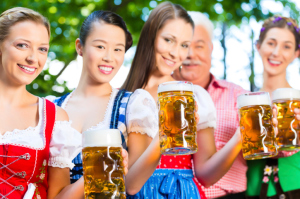Surely you’ve heard about Oktoberfest before today. But do you really know about the history, origins, and reasons behind it? Surprise! It’s not all about beer.
 History
History
The first Oktoberfest began on October 12, 1810, when King Ludwig I, then Crown Prince, married Princess Therese of Saxony-Hildburghausen and invited all the citizens of Munich to attend a joyous party on the fields in front of the city gates. That area was coined, “Theresienwiese” (or Thereas’s Meadow”) in honor of the Crown Princess. To conclude the event on October 17, horse races were held in the presence of the Royal Family. The decision to hold the horse races the next year, and in subsequent years, started the annual tradition of Oktoberfest.
Over the next hundred years, the festival attractions slowly changed and grew in number. By the early 1880s, there were more than 400 electrically illuminated tents and booths. By 1896, the small beer stands were replaced by larger beer tents and halls that could accommodate more guests and musicians. By 1910, on its 100th anniversary, somewhere around 120,000 liters of beer were poured at Oktoberfest.
But contrary to popular belief, it wasn’t always all about the beer. It was, and is still today, also about eating lots of traditional, hearty German foods such as pretzels (brezn), sausages (würstl), Sauerkraut, dumplings made from potato or bread (knödeln), Steckerlfisch (grilled fish on a stick), and so much more.
Today
Modern Oktoberfest is a 16-day festival held in Munich, Germany, from late September to early October. It has grown to be one of the most famous events held in Germany and the largest fair in the world, with approximately six million attendees each year. The traditional horse races are no longer held, but there are new traditions such as a parade, a ceremonial twelve-gun salute, and tapping of the first keg of Oktoberfest beer which signify the start of the festival.
To keep Oktoberfest fun and appropriate for all, “quiet Oktoberfest” was developed in 2005. Until 6:00 pm, tents only play quiet, usually traditional wind music, so families and older patrons can enjoy the festivities. It helps to keep violence and the over-the-top party mentality at bay as well as preserves the traditional beer tent atmosphere.
Only Oktoberfest beers that conform to the Reinheitsgebot—brewed with water, malt, and hops—are allowed. This is sometimes referred to as the “German Beer Purity Law”. There are currently only 6 breweries that are allowed to produce Oktoberfest beer.
Since we can’t all fly off to Munich each year, celebrations are held around the world in honor of Oktoberfest. If you prefer to hold your own Oktoberfest in the comfort of your own home bar, we here at Clean Beer can get you set up with everything you need to have an epic bash. Contact us today for anything you need – from installation of draught systems to service of your existing system or even rentals of cold plates, party pumps, or Co2—we can help. The only question we have for you is, are we invited?

Leave a Reply